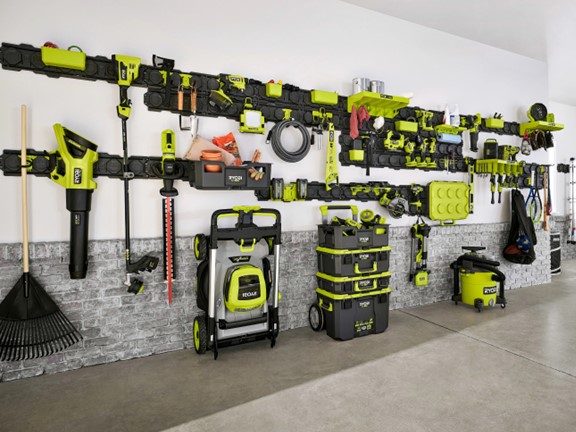Views: 4
Imagine being in the middle of an important project, and your Ryobi tool suddenly runs out of power. Frustrating, right?
Ensuring that your Ryobi batteries are stored correctly can prevent such disruptions. Proper storage not only extends the lifespan of your batteries but also ensures they’re always ready to deliver peak performance. In this guide, you’ll discover simple yet effective tips on how to store Ryobi batteries, helping you save time and money.
So, if you’re tired of dealing with dead batteries and unexpected interruptions, keep reading to unlock the secrets of optimal battery storage. Your tools—and your future projects—will thank you.
Contents
Importance Of Proper Battery Storage
Storing Ryobi batteries properly ensures they last longer. Keep them in a cool, dry place away from direct sunlight. Avoid extreme temperatures to maintain their performance and safety.
Proper storage of Ryobi batteries is crucial for maintaining their performance and extending their lifespan. Neglecting this aspect can lead to reduced battery efficiency, shorter battery life, and even potential hazards. Let’s dive into why proper battery storage is so important and how you can ensure your Ryobi batteries remain in top condition.Understanding Battery Degradation
All batteries degrade over time, but improper storage can speed up this process. When stored in extreme temperatures, battery cells can break down faster. Keeping your Ryobi batteries in a cool, dry place can significantly slow down this degradation.Avoiding Temperature Extremes
Extreme temperatures are a battery’s worst enemy. Heat can cause the battery cells to expand, while cold can reduce their capacity. Store your batteries at room temperature to maintain their optimal condition.Keeping Batteries Charged
Have you ever left a battery unused for months only to find it dead? Ryobi batteries, like many others, should be stored at a 40-60% charge. This charge level prevents them from discharging completely, which can be damaging.Using The Right Storage Containers
Not all storage solutions are created equal. Use containers that protect against moisture and dust. A simple plastic storage box with a lid can work wonders in keeping your batteries safe.Regularly Checking Battery Health
Out of sight shouldn’t mean out of mind. Regularly check your stored batteries for any signs of damage or leakage. Catching these issues early can prevent bigger problems later on.Safeguarding Against Short Circuits
Ever wondered why battery terminals should be covered? Exposed terminals can lead to short circuits if they come into contact with metal objects. Use battery caps or store them in a way that terminals are not exposed.Real-life Impact Of Proper Storage
Once, I left a battery in my garage over winter, thinking it was safe. Come spring, it was unusable. This taught me the importance of proper storage, and since then, my batteries have lasted much longer. How are you storing your Ryobi batteries? Could better storage practices save you money and frustration? Implement these strategies today and see the difference it makes!Ideal Storage Conditions
Store Ryobi batteries in a cool, dry place. Keep them away from direct sunlight and heat sources. Maintain room temperature for optimal longevity.
Storing Ryobi batteries properly can significantly extend their lifespan and ensure they perform at their best when you need them. Ideal storage conditions play a crucial role in maintaining the battery’s health. Whether you are a DIY enthusiast or a professional tradesperson, knowing how to store these batteries can save you time and money in the long run.Temperature Guidelines
Temperature is a crucial factor in battery storage. Ryobi batteries thrive in moderate temperatures, ideally between 50°F and 77°F (10°C and 25°C). Storing them in hot environments, like a sunny garage, can lead to overheating, reducing the battery’s efficiency and lifespan. On the flip side, extremely cold temperatures can also be damaging. Cold environments may cause the battery to lose charge more quickly. If you’ve ever left a battery in a freezing car overnight, you know the struggle of a non-responsive tool the next day. Keep them in a climate-controlled area for optimal performance.Humidity Considerations
Humidity is often overlooked, but it plays a significant role in battery storage. High humidity levels can lead to moisture build-up, which may cause the battery to corrode. Once, I left a battery in a damp basement, and it didn’t last a year due to corrosion. Aim to store your batteries in a dry environment. If you live in a particularly humid area, consider using a dehumidifier in your storage space. Alternatively, store the batteries in a sealed container with silica gel packets to absorb excess moisture. Have you ever thought about how small changes in storage can impact battery life? By paying attention to temperature and humidity, you ensure your Ryobi batteries are ready for action whenever you are. Making these small adjustments in your storage habits can make a big difference in the longevity and reliability of your tools.Preparing Batteries For Storage
Proper storage extends the life of Ryobi batteries. Keep them in a cool, dry place, away from direct sunlight. Charge to around 40% before storing to prevent over-discharging.
Preparing your Ryobi batteries for storage is a crucial step to extend their lifespan and ensure they’re ready for your next project. Whether you’re a DIY enthusiast or just someone who loves keeping their tools in tip-top shape, understanding the right storage practices can make a big difference. You might be surprised at how a few simple steps can preserve battery performance and prevent unwanted surprises. Let’s dive into how to clean, charge, and store your Ryobi batteries effectively.Cleaning The Battery
Before you store your Ryobi battery, make sure it’s clean. Dust and debris can accumulate, affecting its connection and performance. Use a dry cloth to gently wipe the battery’s surface. If there’s stubborn dirt, slightly dampen the cloth. Avoid using harsh chemicals that might damage the casing. This simple cleaning routine helps maintain optimal performance and prevents corrosion.Charging Before Storage
Charging your battery before storage is essential. Aim to store it with a charge between 30-50%. Why not fully charge? A full charge might not be ideal for long-term storage, as it can stress the battery. On the flip side, storing a completely drained battery can lead to capacity loss. By keeping it partially charged, you strike a balance, ensuring it’s ready for action when you need it. Have you ever stored a battery and found it dead the next season? You’re not alone. This common issue is why partial charging before storage is recommended. So, how do you prepare your batteries for storage? Do you clean them, charge them, or both? Share your experiences and see if our tips align with yours.
Credit: www.slashgear.com
Choosing The Right Storage Location
Choosing the right storage location for your Ryobi batteries is crucial for maintaining their longevity and performance. Batteries are sensitive to temperature fluctuations, moisture, and even sunlight. Whether you’re a seasoned DIY enthusiast or just starting out, understanding where to store these power sources can make a significant difference. Let’s dive into the details and help you find the perfect spot for your Ryobi batteries.
Indoor Vs. Outdoor Storage
Deciding between indoor and outdoor storage might seem simple, but it can greatly affect your battery’s lifespan. Indoor storage typically offers a stable environment with controlled temperatures. Consider using a garage or basement where you can easily access your tools.
On the other hand, outdoor storage might be tempting due to space constraints. However, it poses risks like exposure to extreme temperatures, which can drain battery life. If you must store them outside, ensure they are in a weatherproof container that shields them from the elements.
Avoiding Direct Sunlight
Think about your usual storage habits. Have you ever left your tools in a sunny spot without a second thought? Direct sunlight can cause overheating, which is detrimental to battery health. Just like you wouldn’t leave your phone baking under the sun, treat your batteries with the same care.
Instead, opt for a shaded area or ensure they are covered. This simple step can prevent overheating and preserve the battery’s capacity. Is there a spot in your home that’s both accessible and shaded? Make it your go-to storage location.
In conclusion, storing Ryobi batteries requires thoughtful consideration of their environment. By choosing the right location and protecting them from sunlight and extreme temperatures, you ensure they remain reliable and ready for your next project. Where will you store your batteries now? Make the right choice, and they’ll thank you with uninterrupted power.
Safety Precautions
Store Ryobi batteries in a cool, dry place away from direct sunlight. Keep them at room temperature to maintain performance. Ensure they’re positioned upright to prevent damage and never store them in metal containers.
Storing Ryobi batteries properly is crucial not only for prolonging their lifespan but also for ensuring safety in your home or workspace. Safety precautions are essential when dealing with lithium-ion batteries, like those used in Ryobi tools. Neglecting these precautions can lead to accidents, damage, or even fires. Let’s dive into some practical measures you can take to handle these batteries safely. ###Handling Lithium-ion Batteries
Lithium-ion batteries are powerful and efficient, but they also require careful handling. Always store them in a cool, dry place, away from direct sunlight or heat sources. Extreme temperatures can degrade the battery, reducing its lifespan and efficiency. Never keep batteries in a fully discharged state for prolonged periods. This can lead to battery failure. Charging them at around 50% before storage can help maintain their health. It’s like keeping your phone charged before a long trip—just good practice. Avoid dropping or puncturing the batteries. Physical damage can result in leaks or even short circuits. I once dropped a battery on a concrete floor, and I learned the hard way that a cracked case can render it useless. Handle them with care to avoid costly mistakes. ###Fire Safety Measures
Fire safety is a paramount concern with lithium-ion batteries. Always store them in a location away from flammable materials. A dedicated battery storage case or container is ideal for minimizing fire risks. Consider using a battery management system (BMS) if you have multiple batteries. This system can monitor the voltage and temperature of each battery, alerting you to potential issues before they become hazardous. It’s like having a smoke detector for your batteries—peace of mind for you and your family. In the event of a fire, never use water to extinguish it. Lithium-ion battery fires require a Class D fire extinguisher. Would you know where to find one in your home or garage? It’s worth checking now. By following these safety measures, you can ensure your Ryobi batteries are stored securely and efficiently. What steps will you take today to improve your battery storage practices?
Credit: www.slashgear.com
Extending Battery Lifespan
Proper storage of Ryobi batteries can greatly extend their lifespan. Keep batteries in a cool, dry place away from direct sunlight. Avoid storing them in extreme temperatures to maintain optimal performance.
Extending the lifespan of your Ryobi batteries is more than just a cost-saving measure; it’s a way to ensure that your tools are always ready for action. Proper storage and maintenance can keep your batteries functioning optimally, providing reliable power for all your projects. Have you ever wondered why some batteries seem to last longer than others? Let’s dive into some practical strategies to get the most out of your Ryobi batteries.Regular Maintenance Tips
Regular maintenance of your Ryobi batteries can make a noticeable difference in their longevity. Clean the battery contacts with a dry cloth to prevent dust and debris from interfering with the connection. This simple step can help ensure efficient power transfer. Avoid storing batteries in extreme temperatures. Ideally, keep them in a cool, dry place away from direct sunlight. Did you know that heat can significantly degrade battery performance? Keeping them cool can prolong their useful life. Charge your batteries fully before storage. A partially charged battery can lose its capacity over time. When was the last time you checked the charge level before storing?Avoiding Common Mistakes
One common mistake is leaving batteries on the charger indefinitely. This can overcharge and damage them. Remove them from the charger once they are fully charged. Another mistake is storing batteries in damp or humid environments. Moisture can seep into the battery, leading to corrosion and reduced efficiency. Consider where you store your tools and batteries. Is it a dry, secure spot? Finally, avoid using batteries with visible damage. Cracks or leaks can be signs of compromised safety. Inspect your batteries regularly. Have you ever noticed any wear and tear that might need attention?Troubleshooting Storage Issues
Proper storage of Ryobi batteries is crucial for their longevity. Issues may arise during storage that affect performance. Identifying these problems early can prevent damage and ensure efficient use.
Identifying Battery Damage
Examine the battery for physical signs of damage. Look for cracks or leaks. These indicate serious issues that require immediate attention. Check for corrosion around the terminals. This can impair battery function. Swelling or bulging is a sign of internal failure. Discolored or warped casing may suggest overheating. Any unusual odors could signal chemical leaks. Identifying these signs helps prevent further complications.
Solutions For Common Problems
Corrosion can be cleaned using a mixture of baking soda and water. Apply gently with a brush to remove residue. Swelling or bulging requires professional inspection. Do not attempt to use or fix such batteries. If the battery overheats, ensure it cools before use. Store in a cooler environment to prevent recurrence. For discolored or warped casings, avoid using the battery until checked by a professional. Regular maintenance and careful handling can reduce storage issues.

Credit: espanol.ryobitools.com
Frequently Asked Questions
How Do You Store Ryobi Batteries For Winter?
Store Ryobi batteries in a cool, dry place during winter. Ensure they’re charged to about 50% capacity. Avoid extreme temperatures as they can damage the battery cells. Regularly check their charge level if stored for long periods.
Can Ryobi Batteries Be Stored In The Garage?
Storing Ryobi batteries in the garage is acceptable if the temperature is moderate. Extreme cold or heat can affect battery life. Ensure the garage is dry to prevent moisture damage. It’s best to keep them on a shelf, away from the floor.
What’s The Best Temperature To Store Ryobi Batteries?
The ideal storage temperature for Ryobi batteries is between 50°F and 77°F (10°C to 25°C). This range helps maintain battery health and longevity. Avoid storing them in areas prone to extreme temperatures, like attics or basements.
How Long Can Ryobi Batteries Be Stored Unused?
Ryobi batteries can be stored unused for several months if properly maintained. Charge them to around 50% before storing. Regularly check and recharge if necessary to prevent deep discharge. Proper storage ensures the battery remains functional.
Conclusion
Proper storage extends Ryobi battery life. Always store batteries in a cool, dry place. Avoid extreme temperatures to prevent damage. Keep terminals clean and free from debris. Regularly check battery charge levels. Charge batteries before long storage periods. This prevents battery drainage.
Use storage cases for added protection. Organize to find them easily later. Follow these tips for better battery performance. Save money and hassle with proper care. Enjoy longer usage from your Ryobi tools. Batteries last longer with the right storage.
Simple steps make a big difference.

